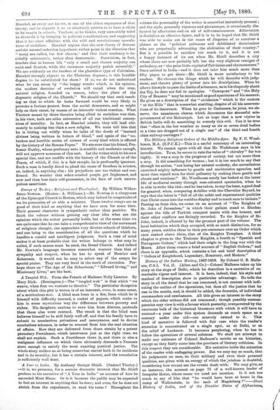A Year in India. By Anthony; George Shiell. (Samuel Tinsley.)
—It is, we presume, for a certain dramatic interest that Mr. Shiell prefixes to his narrative of "A Year in India" an account of how he ascended Mont Blanc. Or is it because the public may be expected to feel an interest in anything that he does.; and even, for he does not shrink from the experiment, to read his verse ? Throughout the
volume the personality of the writer is somewhat intrusively present ; and the style, generally vigorous and picturesque, is occasionally dis- figured by affectation and an air of self-consciousness. Alliteration is doubtless an effective figure, and it is to be hoped that Mr. Shiell was :able to make use in the cause of Jingoism of so sonorous a phrase as the "political poltroons and debilitated doctrinaires who are perpetually advocating the abdication of their country." But it is possible to sacrifice too much to it, and it is not a happy instance of its use when Mr. Shiell describes a city where there are now probably left but the very slightest vestiges of orthodoxy, as "the prim little capital of Calvinism and chronometers." Once arrived in India—and it does not take him mach more than fifty pages to get there—Mr. Shiell is more satisfactory to his readers. He chooses the things which he will describe with judg- ment, and throws plenty of power into his descriptions. When he allows his style to pass the limits of soberness, as in his rhapsody about the Taj, he does not fail to apologise. " Cawnpore " and "the Holy City of Benares " may be mentioned as good specimens of his manner. He gives us a description of the " cicisbeism" which is the custom "at the Hills" that is somewhat startling, despite of all his assevera- tions of its innocence. When he gets to Cashmere, he joins, we ob- serve, the unanimous chorus which denounces the shameful mils- government of the Maharajah. Let us hope that a new regime in British India will do something to remedy this evil. Can it be true that "often in the hot weather as many as six or seven dead bodies at a time are dragged out of a single one" of the third and fourth class railway-carriages ?


































 Previous page
Previous page